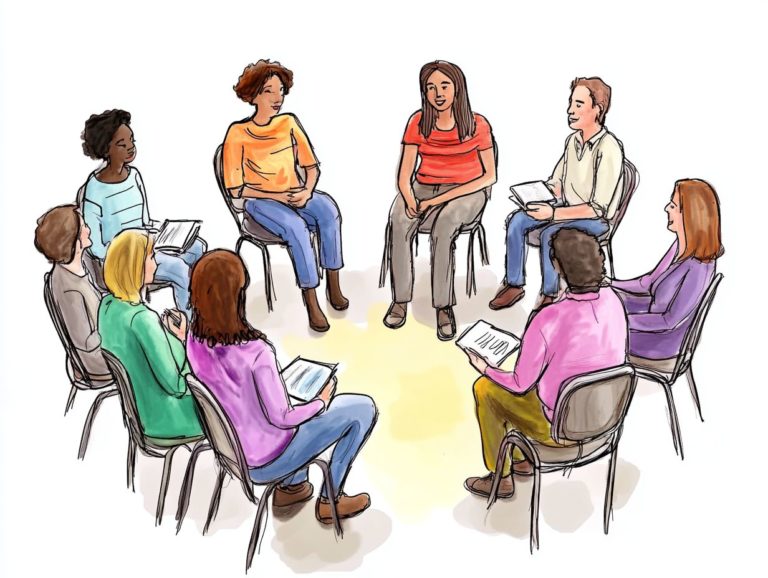How to Cultivate Empathy in Everyday Life
Empathy transcends mere buzzword status; it is a crucial skill that enhances your interactions and fortifies your connections.
This article delves into the true essence of empathy and its significance in both your personal and professional realms. It tackles the common barriers that may obstruct your ability to empathize and offers practical tips to nurture this invaluable skill in your daily conversations.
From enriching personal relationships to creating a more compassionate workplace, discover how embracing empathy can profoundly transform your life.
Contents
- Key Takeaways:
- Understanding Empathy
- Barriers to Empathy
- Practicing Empathy in Daily Interactions
- Empathy in Relationships
- Empathy in the Workplace
- Frequently Asked Questions
- What is empathy and why is it important in everyday life?
- How can I practice empathy in my daily interactions?
- What are the benefits of building empathy in everyday life?
- How can I develop empathy for people with different beliefs or backgrounds?
- Is empathy something we can learn?
- How can I teach my children to be more empathetic?
Key Takeaways:

Practice active listening: Show genuine interest and understanding in others by actively listening and responding to their emotions and perspectives.
Be aware of personal biases: Recognize and challenge your own biases and assumptions to better understand and connect with others from diverse backgrounds.
Show compassion and understanding: Empathy goes beyond just understanding someone’s feelings; it also involves showing compassion and support for others in their experiences.
Understanding Empathy
Empathy is your key to truly understanding and sharing the feelings of others. It plays a pivotal role in developing the ability to understand emotions better, compassion, and supportive behaviors in your everyday interactions.
This skill is especially important for children, parents, and caregivers. It equips them to navigate ethical dilemmas, strengthen relationships, and lay the groundwork for appreciating diverse perspectives within a community.
By actively practicing empathy, you can forge deeper connections with others. This enriches your emotional responses and enhances your commitment to community service.
Definition and Importance
Empathy is defined as your ability to recognize, understand, and share the feelings of others. This skill is a vital aspect of emotional intelligence and social connection.
Not only does this ability enrich your relationships, but it also acts as a cornerstone for managing your emotions in a healthy way. By cultivating empathy, you gain a deeper understanding of diverse perspectives, paving the way for moral growth and ethical behavior.
For instance, when you and your community members engage in open dialogues about your experiences, you often discover common ground and shared emotions. This connection heals rifts and strengthens social bonds.
You will see this in community-led initiatives where empathy fuels collaboration, ultimately creating a supportive environment where everyone feels valued and heard.
Barriers to Empathy
Empathy is crucial for forging meaningful connections and truly understanding others. However, various barriers can impede its practice.
You may encounter obstacles such as stress management, defensiveness, emotional reactions, and a lack of self-control that can stand in your way.
Common Obstacles and How to Overcome Them

Common obstacles to practicing empathy often include preconceived notions, stress-induced reactions, and a tendency to shy away from embracing the perspectives of others. These barriers can significantly impede the formation of meaningful connections and understanding between individuals.
To navigate these challenges, it is essential that you cultivate open-mindedness. This gives you the power to approach conversations without judgment and with a genuine willingness to consider differing opinions.
Active listening is equally vital. You can improve by engaging fully with what others are expressing, rather than merely awaiting your turn to speak.
By incorporating mindfulness into your interactions, you can remain present, mitigate stress reactions, and foster a more compassionate atmosphere, ultimately enabling deeper emotional connections.
Practicing Empathy in Daily Interactions
Practicing empathy in your daily interactions demands intentional effort. This includes honing your active listening skills, being attuned to body language, and cultivating the ability to offer constructive feedback with an open mind.
Each of these elements enhances your connections and fosters a deeper understanding of those around you.
Tips for Cultivating Empathy
To cultivate empathy, you can use various techniques. These include asking insightful questions and practicing perspective-taking. Demonstrating kindness in your interactions is also crucial.
By weaving these strategies into your daily life, you can gradually enhance your ability to understand and manage your feelings and those of others. This fosters deeper connections with those around you.
For instance, asking open-ended questions promotes meaningful conversations. This allows you to delve into the feelings and thoughts of others.
Practicing perspective-taking means envisioning a situation from someone else s viewpoint. This helps to reduce biases and deepen your understanding.
Demonstrating kindness uplifts those around you and creates a supportive environment.
Now is the perfect time to reflect on your interactions and consider embracing these practices to nurture a more empathetic mindset.
Empathy in Relationships
Empathy is essential for cultivating meaningful relationships. It allows you to deepen your connections by truly understanding the diverse experiences and perspectives of others.
Whether it s within your family, among friends, or in the broader context of community service, embracing empathy can transform interactions and foster a sense of unity and support.
How to Strengthen Empathy in Personal Connections

Strengthening empathy in your personal connections requires intentional practices. These include role play and fostering compassion. Both methods enhance your emotional awareness and deepen your relational bonds.
Engaging in role play allows you to step into someone else s shoes. This helps you gain insights into different perspectives and feelings. This technique can be especially effective during discussions about sensitive topics, as it encourages you to explore others’ experiences with an open heart.
Creating spaces for open dialogue, where feelings and thoughts can be shared without judgment, is crucial for building trust and understanding.
By regularly practicing these methods, you create a more compassionate atmosphere that not only improves your emotional connections but also fosters greater awareness and sensitivity toward the needs of others.
Empathy in the Workplace
Empathy in the workplace is essential for cultivating a positive environment.
By embracing empathetic leadership, you foster strong relationships among colleagues. This inevitably enhances both productivity and morale.
Benefits and Strategies for Empathetic Leadership
The benefits of empathetic leadership are significant: you ll see improved employee engagement and higher job satisfaction. It also helps create a supportive workplace culture. This can be achieved through effective feedback and a strong sense of emotional awareness.
When you foster an environment where team members feel heard and valued, you boost morale and encourage open communication.
To truly implement empathetic leadership, consider regularly checking in on your employees’ well-being. Actively soliciting their feedback on team dynamics is also beneficial.
You can leverage emotional awareness by being attuned to non-verbal cues and adjusting your communication style accordingly. Providing constructive feedback that highlights both strengths and areas for growth fosters a culture of understanding. This allows individuals to feel supported rather than criticized.
This approach ultimately builds trust, enhances collaboration, and drives overall team success.
Frequently Asked Questions
What is empathy and why is it important in everyday life?

Empathy is the ability to understand and share the feelings of others. It helps us connect and build relationships.
How can I practice empathy in my daily interactions?
One way to practice empathy is by actively listening to others and trying to understand their perspective. Another way is by putting yourself in someone else’s shoes and imagining how they may be feeling.
Start today every small act of empathy counts!
What are the benefits of building empathy in everyday life?
Building empathy can significantly improve communication and strengthen relationships.
It also helps create a caring and welcoming community!
How can I develop empathy for people with different beliefs or backgrounds?
Educate yourself about various cultures and perspectives.
Practice listening closely and stay open-minded during conversations.
Is empathy something we can learn?
Some people are naturally empathetic, but everyone can learn this important skill.
With practice and dedication, you can enhance your empathy over time.
How can I teach my children to be more empathetic?
Children learn best through example.
Show empathy in your actions and encourage your kids to consider how others feel.






